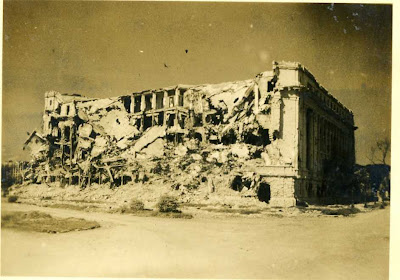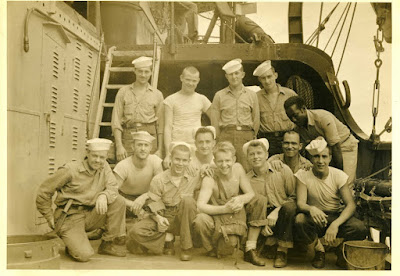

The above is the crew men of the Albert W Grant, DD 649, just before the battle of Leyte. James Bradley yesterday in the NY Times published apiece stating the history of what he saw as the seed which led to Pearl Harbor. Bradley begins the article as follows:
"SIXTY-EIGHT years ago tomorrow, Japan attacked the American naval base at Pearl Harbor. In the brutal Pacific war that would follow, millions of soldiers and civilians were killed. My father — one of the famous flag raisers on Iwo Jima — was among the young men who went off to the Pacific to fight for his country. So the war naturally fascinated me. But I always wondered, why did we fight in the Pacific? Yes, there was Pearl Harbor, but why did the Japanese attack us in the first place?"
It is always good to ask the question, again and again, for every conflict has a beginning, a small, and at the time inconsequential act, driven often by the egos of those in power.
If one reads the Bradely piece, he appears to attribute the cause to the arrogant and ignorant acts of Teddy Roosevelt who sided with Japan against Russia and through Teddy's back channel communications with the Japanese placed the Russians at a disadvantage and in turn set the course for Japanese expansionism. This was especially true of "giving" the Japanese the Korean Peninsula. Or as Bradley states:
"To signal his commitment to Tokyo, Roosevelt cut off relations with Korea, turned the American legation in Seoul over to the Japanese military and deleted the word “Korea” from the State Department’s Record of Foreign Relations and placed it under the heading of “Japan.” "
Thus the American President, the first to receive a Nobel Peace Prize for the effort, while in office, sowed the seeds for the next conflict. As Bradley continues:
"It was for his efforts to broker the peace deal between Russia and Japan that a year and a half later Roosevelt became the first American to win the Nobel Peace Prize — and one of only three presidents to do so while in office (the other two are Woodrow Wilson and President Obama, who will accept his prize this week). No one in Oslo, or in the United States Congress, knew the truth then.
But the Japanese did. And the American president’s support emboldened them to increase their military might — and their imperial ambitions. In December 1941, the consequence of Theodore Roosevelt’s recklessness would become clear to those few who knew of the secret dealings. No one else — including my dad on Iwo Jima — realized just how well Japan had indeed played “our game.”"
Bradley seems to be making many subtle points. First, Teddy was in many ways a naive man, one driven by his personal ego and persona, one who came to office young, and highly inexperienced. He did things almost on a whim, and tried to align himself with the world view he created which had little grounding in reality. He knew nothing of Japan and the Japanese. He was surrounded by people who for the most part knew even less. Second, the nature of what a President does is often hidden for years, if not forever. It is only through glimpses gathered decades or centuries later that we can patch the sequences together and determine the ultimate causes of disasters. Third, patters do repeat, again and again.
On this 68th anniversary of Pearl Harbor, we should keep some of these in mind. Japan was not a victim, it was not forced to act, in fact it was aided and abetted like a spoiled child into moving in a predictable manner to do what it did. Can that be said of all such attacks?
Thus Mr. Bradley, in honor of your father, mine, and the millions of others who fought and served this country, we think again of that day the lessons from history we had better learn.



